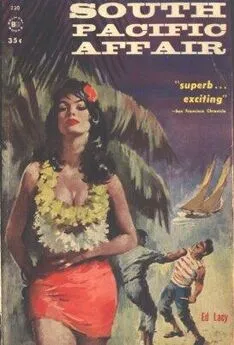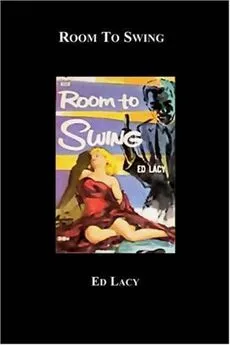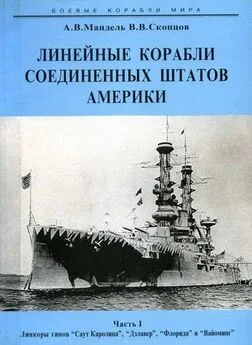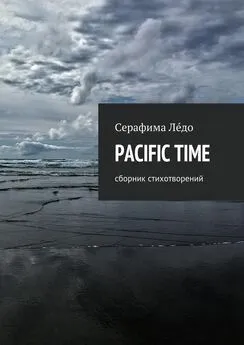Ed Lacy - South Pacific Affair
- Название:South Pacific Affair
- Автор:
- Жанр:
- Издательство:неизвестно
- Год:неизвестен
- ISBN:нет данных
- Рейтинг:
- Избранное:Добавить в избранное
-
Отзывы:
-
Ваша оценка:
Ed Lacy - South Pacific Affair краткое содержание
South Pacific Affair - читать онлайн бесплатно полную версию (весь текст целиком)
Интервал:
Закладка:
“I don't mind this,” I said, and I didn't. It was a good feeling, the cold rain on my back and legs, Ruita's hot body against my chest and stomach.
We were up before daylight, both cold and damp, rubbed each other down with our hands to keep warm, then started work as soon as it was light. Ruita made enough mats to roof over our lean-to, then more fiber cloth to cover our hips. I polished up several coconut bowls, tried my luck at crab casting. After awhile I got the knack and managed to bag four of them without being nipped.
We slept a long time in the heat of the afternoon, then at night when the tide was low Ruita tied my knife to a stick and we went knife-fishing in the shallow water. She wanted to make a fire by rubbing sticks into fibre but I cheated again—no point in carrying this Scout stuff too far— by using my lighter, first kicking a tiny crab out of my pants pocket. Using bundles of coconut husks tied around a stick for a torch, we carefully waded in knee-deep water till we came upon a sleeping fish. Ruita would spear him the first time, but I always missed—to her delight I struck at an angle while the trick was to have the knife enter the water absolutely vertical, otherwise the water deflects the blade.
However, the fish I missed merely swam out of the light of our torch and went to sleep again, so in less than an hour we had enough for a tremendous meal.
I don't know why I use the term “hour” for we lost all track of time. I don't even know how many days we spent there; about eight or nine, at least. It was an ideal existence—for a time. We arose whenever we felt like it, ate when we were hungry, slept any time, made love any place. One cold and stormy night we spent beside a fire in our lean-to, talking all night long—about books, movies, radiation, Australia, America, even religion.
There wasn't a thing to worry about. Food was always within reach, we had a sandy beach and the clear Pacific at our doorstep for swimming and bathing, and if we lacked drinking water—we had nothing in which to catch the rain water—a cool drinking nut was as satisfying. True, we only had fish and nuts and crabs for food, but Ruita was so good a cook, the food never grew tiresome. We ate fish: raw, roasted, broiled, and once she merely tossed a big ten-pound fish on a fire of coconut husks, not even cleaning it. When I asked why, Ruita said, “This will be like fried fish—the guts provide our grease.”
The fish cooked till it was burned black, then Ruita tossed it into the sea, cleaned out the insides and the charred out side—and we had one of the finest-tasting dishes I'd ever eaten.
I sometimes wondered why I was making such a fuss over a little thing like a well-done fish, and realized that in our island it was the little things that counted—the extra few minutes' sleep in the warm sun, the heat of our pressed bodies against the night cold. If possible, I was more in love with Ruita, for I found her so capable, astonishing with knowledge of so many things, intellectual and physical... and last, and never least, the deep heights of passion we reached—a passion I never thought that I, at least, had in me.
It seemed a paradise, every man's dream come true. Yet after a while, maybe four or five days, I had to admit I was bored. I didn't know exactly what I wanted to do, except I wanted to do something. There wasn't a lick of work to be done, no problems, no need for even getting up if I didn't feel like it. Yet I was restless, jumpy. It frightened me because I could see the same thing happening if we were together on Numaga... this stupid restlessness building up till I did something crazy to hurt her—like taking off, or losing myself in a bottle. I tried to talk myself out of it, began lying awake at night and telling myself there were millions of men in the world tied in knots by tension and worry who would give an arm for what I had. But it seemed as if I had too much of peace and quiet. Not too much of Ruita; two people were never as intimate, sharing every second of the other's life—I wasn't tired of Ruita. It was simply this gnawing rotten feeling of wondering what was going to happen next in a little world where nothing was ever going to happen.
One morning after we had taken our swim—and bath— in the lagoon and were walking along the beach to dry off, I began to trot, then to run. Ruita ran with me, not the knock-kneed jerky style most girls use, but with long firm strides. We circled the island several times, running like sprinters, sweating and fighting for air. I was pooped and dropped to the sand, trying to get my breath back. Ruita walked around slowly, her chest heaving. Finally we both took a dip and lay on the sand. After many minutes of silence she asked, “Why did you run like that?”
“I don't know. I guess I wanted to tire myself out.”
“But why do you wish to tire yourself?”
I-shrugged. “Sometimes a man simply wants to exercise.” Of course I was lying. I'd run because I suddenly felt I had to do that stupid something, have some action.
She didn't say anything and I turned over to give my stomach a chance to dry. She laughed and ran a finger over the deep tan of my middle, said, “Now you are like an islander, like us.”
I wanted to say, “I wish I were,” but instead I merely asked, “Speaking of the islanders, how soon do we have to go back to the others, to Forliga?”
Ruita sat up. “Aren't you happy here, Ray?”
“Can you doubt my happiness?” I asked, pulling her to me, feeling the smooth coolness of her skin against mine. “It's... uh... just... Eddie will be expecting me. And Nancy must be wondering...”
“We do not ever have to return. If we wish we can stay right here for the rest of our lives.”
“You mean that?” I asked, floored by the idea.
“What reason is there for us to return?” Ruita asked, using French as she always did when excited or rattled. “Oh, Mama will come out to visit us and so will Eddie. But we have land, food, shelter, and each other. That is enough for a good life. In time we'll probably have children and be even happier.”
Holding her close to me, I looked into her cool eyes as I asked, “Would you be content with that?” And I told myself that there wasn't any real reason why we shouldn't stay here and be happy, yet I knew I'd blow my stack if I had to spend another week in this solitude.
She said, “Darling, if you want, I would try it—”
“No, honey, that isn't what I asked. Look, in a crazy confused way, your answer is very important to me. Is this what you want most, our remaining on this islet?”
She shook her head. “No. What I want most is to live on Numaga with you.”
“Why there instead of here?”
“Mainly because there is more to do there. In time I would get a little bored here.”
I kissed her. “Thanks! You've taken a load off my mind. This... uh... bored stuff was making me think I was cracked.”
She kissed me, little, light, hot kisses. “Is that what troubles you, you are bored with me?”
“Nothing troubles me.”
“Oh, yes. Something worries you, Ray. I feel it. This small drawing back, this unknown thing holding you apart from me at times.”
“That's nonsense. You dream it,” I lied, and then and there I made a large mistake. For if I had told her the truth we might have talked it out, saved both ourselves months of unhappiness. “What are you handing me, this East is East and never the... whatever it is... shall meet, slop?”
She tried to pull away from me, her eyes angry, but I held her tightly. She said, “That is a... a... mean thing, a cruel thing to say. We have found in our being together the greatest contentment I will ever know. Surely you must feel the same way.”
“Forgive me, I was trying to be clever. A minor Western sickness—we must make clever talk all the time. Darling, there's no need to twist words. I have been a little restless here because I'm not conditioned to lying around all day. Although I try to deny it, I suffer from another form of sickness—a reflex known as work.”
She kissed me, then laughed, her warm breath fanning my lips. “My Ray, do not sound so ashamed. No one can live in... this scientific name I learn years ago... yes, in a vacuum. One of your silly popaa words that—”
“Don't say 'your'—it puts a thin wall between us.”
She nodded, her black hair brushing my forehead and eyes. “I am sorry. I do not wish even a cobweb between us. Now do not be angry if I use another popaa saying I learned in school—all work and no play makes Jack a dull chap. And the same goes for all play. But here we have no difference between work and play. The thing is to have a number of ways to play. You understand me?”
“Aha.”
“Aha?” she repeated. “What does that mean?”
“A slang way of saying yes.”
“Ah, I have heard much of this slang, some day you will teach it to me. Back on my island we will each have many things to teach the other. We will not only have what we have here, but also a fine house that needs little daily care, and an ice box in which many kinds of foods may be stored. And we will have a radio to be smug about the news of the peoples outside our island. Also, there will be my pearl cultures, which take up much time and are a wonderful game. We have many books and magazines, records, boats, and if we wish, we can do some 'work' by making copra. Oh yes, and there will be other people around us—not too many to spoil our privacy, but they have problems, gossip, and that is interesting. Now and then we shall go to Papeete, see the awful movies and the swaggering drunken tourist popaas, and we will be disgusted, happy to run back to Numaga again. Now, I have been waiting for you to say it first, but I will— shall we go back to Forliga?”
I nodded. She moved in my arms and I said, “But I think we have one or two things still to do.”
Late in the afternoon we put on our clothes and left the islet—not without some regret on my part, regret mixed with relief—and paddled back to Forliga. Passing the Hooker, I saw how low she was in the water, knew we had a full hold of copra. We put the canoe up on a wooden rack and waded ashore. Some kids told us Nancy was in the guest hut. Eddie was also there, along with the Chief, and several other islanders. They greeted us with the greatest casualness, as if we had merely returned from an hour's sail.
The radio in Titi's hut next door was playing a watered-down version of “La Jazz Hot” but we could barely hear it. He had probably shot his batteries playing the set all during the wedding feast. Nancy kissed Ruita and merely asked, “How are you, dear?”
“Fine, Mama. How is Titi's wife?”
“Very good and very large. I think she will have twins.”
Eddie slapped me playfully in the gut, said, “Got the boat loaded. Damn copra is almost turning rancid.”
The old guy with the rusty outboard shook my hand, said he had been waiting for me to fix his motor. I told him, “I hope I'll have the time. With a full hold, we will sail soon, take the Adams' home to—”
“You'll have time,” Eddie cut in. “There's a smallpox epidemic going around. The governor in Papeete has ordered all boats- to stay in port till further notice.”
“When did that start?” I asked, as though it made any difference when it started.
“We heard it on the wireless last week,” Nancy said. “Started in the Cook Islands. So far there have only been a few deaths and I suppose they'll have it under control if they can keep it from spreading.”
Cumber, the Chief, said a fast prayer in Tahitian, the other joining him; every family in the atolls had lost one or more people in the last great epidemic—flu. There was a moment of sad quiet broken by Ruita saying, “I look forward to staying here. Mama, I am hungry for rice and bread and...”
Читать дальшеИнтервал:
Закладка:










